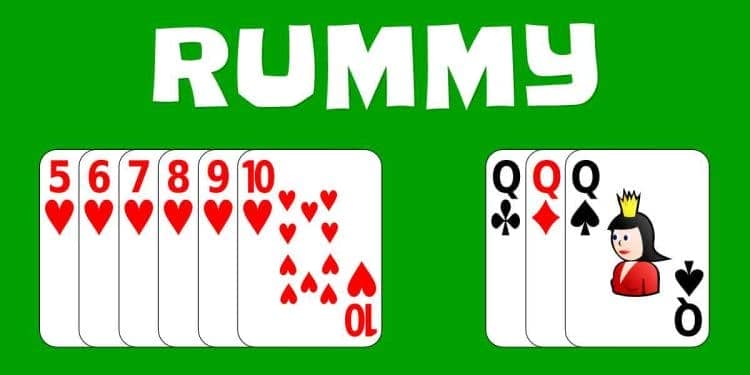Got a deck of cards and some time to spare? Playing Rummy isn’t just a group activity. The real challenge is in melding and discarding cards to form sets and runs, even when you’re your own competition.
Keep reading to learn the ins and outs of this classic card game, perfectly suited for solo play.
Quick Answer
Playing Rummy by yourself isn’t the traditional way, but you can simulate opponents by dealing multiple hands and playing them strategically. Use a standard 52-card deck and deal 10 cards for each “player.” Create melds (sets or runs) and discard as you would in a regular game. Rotate turns between hands, drawing and discarding cards. Aim to empty one hand of cards first to win. This solo method sharpens your skills and strategy for real games.
The Basic Rules of Rummy

Grasping the fundamental rules of Rummy is crucial for becoming proficient at the game. The game begins with 52 cards and the goal is to create valid sequences and sets. A sequence refers to a consecutive series of cards from the same suit, while a set is composed of three or four cards of the same value but different suits.
Let’s dive a bit deeper. Each player is dealt 13 cards, while the remaining cards form the stockpile. You pick a card and discard one every round. The aim is to replace high-value cards (like face cards and tens) with lower value cards, to reduce the points in your hand. The game concludes when a player is able to discard all their cards after creating valid sequences and sets.
A successful strategy should be flexible, depending on the cards in your hand and those discarded by your adversary. The key strategy is to constantly rearrange your cards to identify potential sequences and sets.
Following this, we can look into setting up a Rummy game when playing alone.
How to Set Up a Solo Rummy Game
Setting up a solo game of Rummy requires a few unique steps. You’ll begin as you’d in a typical game by mixing up the deck and distributing the cards. But, the single-player version of the game requires some strategic modifications.
- Start with a 52-card deck. This standard deck size ensures a sufficient number of combinations to keep the game lively.
- Deal two hands to yourself. It’s as though you’re pitting your skills against an unseen adversary. This adds an element of surprise and complexity to the game.
- Set up a draw and discard pile. You’ll pick new cards from and get rid of unwanted ones in these piles, so keeping them separate and clear is vital.
- Set a target score. This objective will maintain focus and add an element of challenge to your solitary game.
These modifications are intended to make the game exciting and engaging when you’re playing solo. They serve as your strategic adjustments to make single-player Rummy as fun as the group version.
Having set up your game, the next step to consider is ‘how to play Rummy alone?’.
How To Play Rummy Alone?

When you’re playing Rummy by yourself, it’s essential to alternate between two hands you’ve dealt. Think of each hand as being played by a distinct player. This method calls for sharp mental dexterity and focus, as you’re managing two different sets of cards, strategies, and possible winning combos.
Initiate by picking a card from the stockpile for one hand. Analyze and decide the optimal path: to incorporate the card into your current sets and runs, or to throw it on the pile. After making a decision, switch to the other hand and repeat. Keep in mind, you’re managing two distinct hands, so avoid mixing up strategies or cards.
Strive to keep an impartial perspective for each hand. Don’t give preference to one over the other. If one hand seems to be ahead, don’t let it sway your choices for the other hand. Endeavor to play each hand to its full potential, striving for a win with both.
Solo Rummy can be a rewarding mental workout that sharpens your strategic abilities. It’s not merely a game of luck, but a challenge to your analytical skills.
Variations of Rummy You Can Play Alone
Playing Rummy by oneself isn’t limited to the classic version. There are other variations of the game that offer unique twists and challenges to enrich your solo gaming experience.
Here are four versions you might find interesting:
- Gin Rummy: A strategic variant, Gin Rummy demands careful decision-making. You’ll have to determine which cards to keep and which to discard to minimize the points in your hand.
- Indian Rummy: This popular version centers around sequences and sets. To succeed, you’ll need to plan and create valid combinations.
- Canasta: In this variant, certain combinations earn you bonus points. It’s about managing your hand effectively for maximum points.
- Kalooki Rummy: Kalooki Rummy adds ‘jokers’ to the mix. These cards can stand in for any other, adding an intriguing element to your game.
Each of these versions offers a fresh perspective on Rummy, enhancing your understanding of the game and refining your strategic mindset. So, why not try these variations in your next solo Rummy session?
Tips for Practicing Rummy by Yourself

You’re set to sharpen your abilities, and we’re here with some useful suggestions to enhance your individual Rummy game. Playing alone is an excellent method to refine your tactics and thoroughly understand the game.
Below are some strategies you can adopt:
| Tip | Description | Benefit |
|---|---|---|
| Practice frequently | Establish a daily routine to play rummy. | Regular practice deepens your knowledge and strategy. |
| Experiment with various forms | Don’t limit yourself to one rummy style. Mix it up! | This enhances your flexibility and adaptability. |
| Review your games | Assess your moves after each game. | This assists in recognizing strengths and areas for improvement. |
| Follow expert strategies | Observe expert players and attempt to replicate their strategies. | This allows you to pick up successful strategies and techniques. |
| Utilize a rummy app | Numerous apps enable you to play against AI. | This ensures continuous challenge and assists in your improvement. |
The secret to mastering rummy lies in comprehending the game and regular practice. So, prepare your deck and begin your practice!



